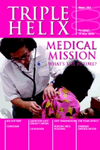The rice pudding had been pushed around my bowl enough times to convince me that no efforts to rearrange or compress it would make it appear that I had eaten anymore than I had. 'Just think of all those starving people in Africa who would love to eat that and you're just going to throw it away,' protested my sister (who would be reminded of this appeal against wastefulness on a future occasion when she was faced with her own culinary nemesis). 'Well you can put it in an envelope and post it to them,' I offered.
A similar appeal to consciences could be directed at the huge disparity between the desperate need for basic medical resources for the majority of our world and the disposable culture that exists in our own health service. How many times have I discarded unused latex gloves after using part of the contents of a sterilised dressing pack? And how many times did my Indian elective hospital wash and autoclave each pair of surgical gloves before a surgeon's protruding finger would point an end to their life span?
A practical, if painfully inadequate, response to bridging this resource gap has been attempted by many a theatre or casualty sister who has faithfully gathered remnants of unused or date-expired medical products and sent them to mission hospitals in needy nations where they can be put to good use. But, not unlike posting rice pudding to Africa, the outcome may fail to match the noble sentiment behind the endeavour. Some with greater ambitions appear to be encouraging surgeons in Malawi and Uganda to extend their operating repertoires by dispatching many metres of cardio-pulmonary bypass tubing. The Zambian mission hospital in receipt of a box of amphetamine-based appetite suppressants would no doubt still be awaiting a suitable candidate had the pills not been consigned to the bin. Such well meaning, but ill-conceived, donations may create problems rather than progress.
Of course recipient hospitals are free to dispose of donated items, which they cannot use, but even this can become an administrative headache. Import duties and transport costs have often turned a consignment designed to bless into a bureaucratic curse. Negotiating with a department of customs and excise can be a time consuming and morale sapping process for a hospital superintendent whose time would be better spent treating patients.
The World Health Organisation urges that donations be based on effective communication between donor and recipient, and strictly avoid any double standards in quality.[1] Good donations result in improvements to the delivery of effective health care, and saved lives.[2] However, the indirect benefits should not be underestimated; the collection or purchase of drugs and medical products can act as a focal activity for supporters, promoting prayer for the work of a mission hospital/relief organisation and a sense of meaningful participation.
Good communication and planning between donor and recipient is essential. Friends of Mvumi Hospital, Tanzania and Kiwoko Hospital, Uganda, for instance, have websites that provide information on current needs.[3] In general, mission hospitals and aid agencies find that monetary donations give them more flexibility (and often additional yield through gift aid), although individuals and churches may wish to designate it for a particular need. Purchasing drugs within a country, where available, avoids the complexities of importation and benefits the local economy. The purchase and shipment of drugs and equipment from the UK is usually best carried out by organisations with expertise in dealing with VAT exemption, packing and customs clearance.[4]
Mission hospitals continue to rely heavily on the generosity of their supporters to carry out their valuable ministry. Donors and recipients bear a responsibility to ensure that these relationships are of mutual blessing.
This article is based on Day JH and Lavy CBD, Pills to Africa: how to donate effectively, BMJ 2001;323:1315
Guidelines for responsible donating
Donors
- Ask first before collecting/despatching.
- Seek advice on the best method of transportation and completion of customs declaration forms.
- Discuss local policies on antibiotics, antivirals, psychotropic drugs and expired or nearly expired items.
- Enclose an itemised list in the official local language, including generic drug names (recipients may not be familiar with trade names) and information on shelf life.
Recipients
- Investigate whether your country has its own drug donation guidelines.
- Ascertain information on the local policy regarding expired products.
- Send a copy of the local drug policy/essential drugs list to your regular donors, or a shopping list of useful products.
- For equipment, consider practical details such as 'What will it plug into?', 'How will it be maintained?' and 'Who will benefit from it?'
- Learn to say 'No' without fear of causing offence.
































